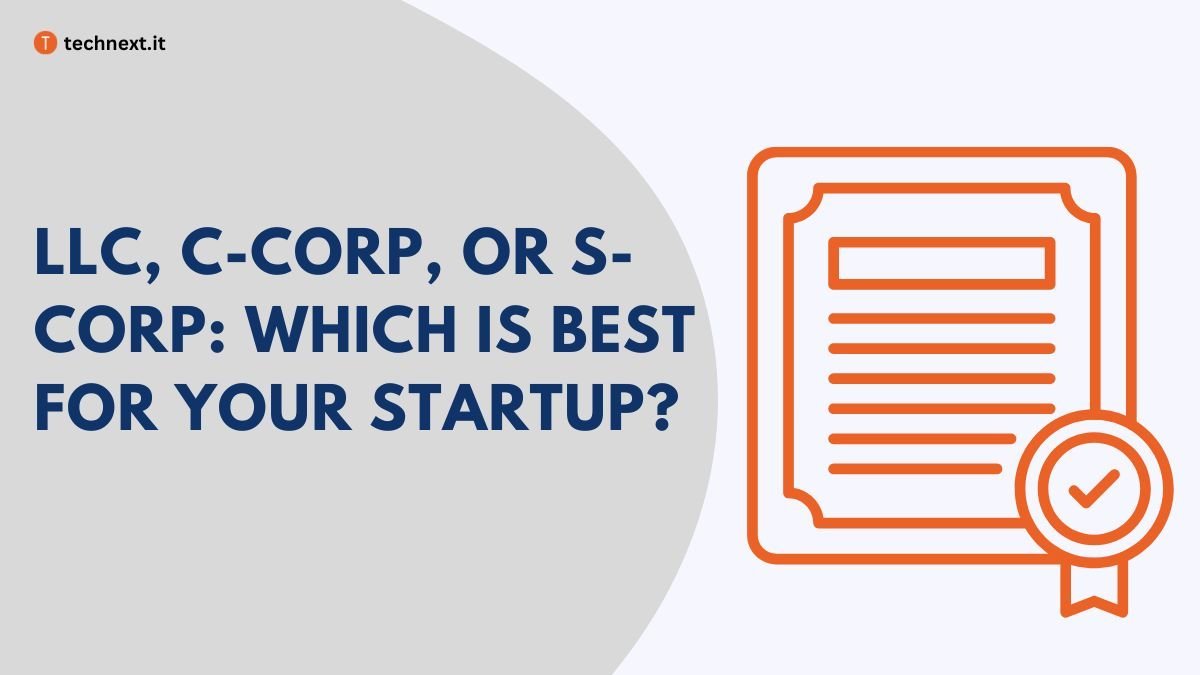LLC, C-Corp, or S-Corp: Which is Best for Your Startup?
LLCs, C-Corps, and S-Corps each have their own advantages and disadvantages, as they are designed to serve different types of businesses. However, which one is better for a technology startup? Let’s discuss.

Starting a new venture is a challenge in itself. All the founders know that it’s riddled with thousands of questions. The first question the founder faces is which legal entities to choose for their startup or how to incorporate their structure.
Although there are a few options to choose from, most startups choose one of LLC, C-corp, or S-corp, and thus the options for startups narrow down to these three.
Even then, selecting one depends on several factors, such as specific circumstances, financing needs, long-term goals, etc. A founder must have a clear understanding of all those factors, and in this article, we will discuss everything you need to know about LLC., C-Corp, and S-Corp to make the right choice.
Navigating Corp Structures for Startups
As we mentioned, there are several options for a new founder; the first thing you need to know as a founder is what those corporate structure options are:
Sole Proprietorships
Sole proprietorships could be the easiest choice for you if you are a small business entrepreneur without VC funding. One-person sole proprietorships are unincorporated businesses. You can receive a DBA certificate for a nominal cost without registering or applying.
Partnership
If you are considering starting a business with one or more partners, a partnership could be a suitable option for you. A partnership is a contractual agreement between two or more people to manage and share the profits and liabilities of the business. Depending on the type of partnership, partners may have limited liability, or there may be a “silent partner” who does not participate in business operations.
Limited Liability Company (LLC)
Are you looking for a corporate structure that offers personal liability protection? Consider forming a limited liability company (LLC). LLCs can be established by individuals or organizations by following their state’s LLC regulations. One benefit of LLCs is that the profits earned are not directly taxed. Instead, profits and losses are distributed to members, who include them on their individual tax returns.
S Corporations (S Corps)
Consider forming an S corporation if you have a small business with 100 or fewer shareholders and want to be taxed like a partnership while enjoying liability protection. As an S corporation, you can have individual shareholders, certain trusts and estates, or tax-exempt organizations as stockholders. Also, the corporation won’t pay corporate taxes since it is a pass-through entity, and its owners/principals will have limited liability.
C Corporations (C Corps)
If you are looking for a business structure that separates your personal assets and income from those of the corporation, you may consider forming a C Corporation. As a C Corporation owner or shareholder, you will receive profits, which are taxed as individual income, while the corporation itself is taxed as a separate entity. C Corporation is the most frequent type of business formation and includes practically all of the characteristics of a corporation.
B Corporations (B Corps)
For a for-profit corporation that prioritizes both mission and profit, you may consider forming a benefit corporation or B corp. These corporations must meet strict standards of accountability, transparency, and verifiable performance.
Close Corporation
While similar to B corps, the structure of a close corporation is less rigid.
Shares are typically not allowed to be traded publicly due to state regulations. In a close corporation, management is handled by a few shareholders instead of a board of directors.
Non-Profit Corporation
If you are looking to establish a tax-exempt organization to operate for charitable, educational, or religious purposes, you may consider forming a non-profit corporation. Non-profit corporations can receive funding from various sources, such as private contributors, for-profit organizations, and government grants.
LLC for Startups: Things You Need to Know
As we mentioned before, it is one of the easiest business structures to form and operate, offers flexibility, and makes it easier when it comes to taxation. So, Is it the right choice for you? Before answering this question, let’s get to know what it actually is, how LLCs works, and their pro and cons.
What Is LLC
A Limited Liability Company (LLC) is a legal business structure in the United States that combines features of both corporations and partnerships (or sole proprietorships).
Compared to corporations, LLCs are easier to form and offer owners more flexibility and security. LLCs are approved and regulated by state statutes, so the rules and regulations differ by state. However, the LLC owner called members in every state.
Forming An LLC
Depending on the laws of your state, you can own an LLC as an individual, a business, a foreign entity, or even another limited liability company. However, it is important to note that banks and insurance companies cannot form an LLC.[1]
If you want to form an LLC, several common requirements must be met across states. Firstly, you will need to choose a name for your LLC. Then, the state will need to file articles of organization that define the rights, powers, liabilities, duties, and other obligations of the LLC’s members.
These articles will also reveal the names and addresses of the LLC’s members, its registered agent, and its purpose. To complete the formation process, you will need to pay a state fee and file the articles of organization. Additionally, you will need to obtain an Employment Identification Number (EIN) by filling out government paperwork and paying a fee.[2]
Discussion Of Key Criteria
When forming an LLC, you may have quite a few concerns like taxes, asset protection, org structure, etc. Let’s talk about that so you can make more informed decisions.
One of the key decisions you’ll need to make is how to structure the management of the company. LLCs offer flexibility in this regard, and you can choose between a member-managed structure and a manager-managed structure, depending on the nature and size of your business, as well as the role you want the members to play.
Another important aspect of LLCs is their taxation. As a pass-through entity, an LLC does not pay taxes on business income. Instead, the profits and losses are recorded on the personal tax returns of the owners. However, if you have employees, you will need to collect and pay payroll taxes.[3]
Another benefit of forming an LLC is the personal asset protection it provides. The LLC, not the owners or managers, is responsible for business obligations and liabilities. This means that the owner’s personal assets are generally not at risk in the event that the company incurs debts or liabilities. The only risk for an owner is the potential loss of their initial capital investment.
Advantages Of LLC For Startups
- LLC allows you to run your business, limited or sometimes without liability issues.
- It helps you to avoid the burden of double taxation.
- LLCs have fewer legal formalities and regulations to follow.
- LLCs provide ownership flexibility by allowing more than 100 shareholders
- LLCs are subject to fewer formal recordkeeping requirements.
- LLC owners have more management options and decision-making power.
- Members of an LLC can place their membership interests in a trust account.
- LLCs allow flexible profit sharing.
- Establishing and running an LLC is simple and inexpensive.
Disadvantages Of LLC For Startups
- Ownership in an LLC is often harder to transfer
- LLCs that work with international companies can be treated as a corporation in those countries.
- Even if an LLC member is reinvested or distributed to shareholders, they need to pay tax.
- Group insurance, medical reimbursement programs, medical insurance, and parking are taxable revenue for LLC employees.
- Banks charge a higher fee for LLC checks.
- Limits on how membership interests can be transferred. It makes LLCs less attractive to investors.
C-Corps for Startups: Things You Need to Know
After LLC, Let’s move on to corporations. As a startup owner, you have two most popular corporation options – C corporations and S corporations. The first one is C- Corps.
What Is C-Corps:
A C corporation (C-corp) is a legal structure for US businesses in which shareholders or owners are taxed separately from the company. This is the most common corporate structure in the United States.
C-Corps are often favored by investors and venture capitalists due to their flexibility in issuing different classes of stock.
Forming C-Corps
To form a C corporation, you must register an unregistered business name with your state government. Then, you will need to file the state-required incorporation papers with the Secretary of State. After that, as a C corporation, you will be able to sell shares to shareholders, who will become the corporation’s owners.
Next, you will need to obtain an EIN (Employer Identification Number) by completing Form SS-4, depending on the jurisdiction, state, or industry in which you operate. [4][5][6]In addition to registration and taxes, your C corporation will need a board of directors to govern and run the company.
Discussion Of Key Criteria Of C-Corps
As an owner of a C-Corporation, you may be aware of the concept of “double taxation.” This refers to the fact that after accounting for losses, deductions, and credits, corporate income tax must be paid on a C- Corporation’s earnings. Additionally, when dividends are distributed to shareholders, they are also subject to the shareholder’s individual income tax.
In terms of management structure, C-Corporations have a more formal setup that includes three groups: shareholders, directors, and members. As an owner of a C-Corporation, you are part of the group of shareholders who elect the directors. The board of directors then hires the company’s president and secretary and sets its strategic direction. As an owner of a C-Corporation, it’s important for you to attend annual meetings with shareholders and directors. Additionally, C-Corporations are required to elect board members and a resident agent.
When starting a company, many prospective owners express concern over potential legal exposure. As an owner of a C-Corporation, it’s important to note that you are usually shielded from personal responsibility for the company’s debts and commitments, though there are some exceptions, such as damages to third parties caused by the owners or if you consider the corporation to be an extension of yourself.
Advantages Of C-Corps For Startups
- Provides an individual legal identity
- No limitations on who can own shares.
- Acceptance by venture capitalists and other investors has been highly prevalent.
- Has an unlimited life span.
- Follow well-established permitted laws.
- Is able to grant stock options.
- Great for equity financing.
- Offers shares that are easily transferrable.
Dis-Advantages Of C-Corps For Startups
- Subjected to double taxation.
- Need to follow more regulations and formalities.
- Have stricter record-keeping requirements.
- High costs to set up.
- Shareholders cannot deduct corporate losses from their personal income statements.
- Time-consuming to start and maintain.
- More complicated, inflexible management structure.
S corporation: Things You Need to Know
Now that you are aware of C-corps and its detail. Let’s move on to the second type of corporation S- the corps.
What Is S Corps?
An S Corporation, often referred to as an S Corp, is a form of business entity that is eligible for special tax status under the United States federal tax code.
It is a type of corporation that does not pay federal income taxes at the corporate level. Instead, the corporation’s income, deductions, and credits are passed on to its shareholders, who report it on their individual tax forms. This means that the S Corporation itself pays no federal income tax, and shareholders only pay taxes on their proportionate share of the corporation’s income.
Forming An S-Corp
To form an S-corp, you need to qualify for certain criteria. Among them, the most important are: You can’t have more than 100 stockholders, it needs to be a domestic corporation, and you can have only one class of stock, etc. All of those make it more fitted for small businesses and less attractive for funded startups.
But If you still choose to form an S corporation, you must register under the state’s corporate laws and then obtain special tax status from the Internal Revenue Service (IRS). This election will allow your business to pass on its income, losses, deductions, and credits to shareholders. Note that an S-corp can only issue one type of stock and must be a domestic entity.
To create an S corporation, you must first incorporate your business. Then, you must submit Form 2553 to the IRS, known as the “Election” by a Small Business Corporation.[7] This form states that the IRS will only accept your S corp status if your business meets all qualifications and all shareholders have signed the consent statement, an officer has signed the form and you have provided the exact name and address of the corporation and other required information.
Discussion Of Key Criteria Of S-Corps
As an owner of an S-Corp, you will enjoy the flexibility in management and profit distribution that it offers. However, you should also be aware that there are more restrictions on the types of shareholders that are allowed. Shareholders or stockholders are corporate investors, and as an S corp, you can only have natural persons as shareholders with one class of shares, making ownership tracking easy. You may also have a board of directors corporate structure to separate ownership governance (a board of directors) from management (officers).
One of the reasons S corporations are popular among business owners is its liability protection. S corporations provide limited liability protection, which means that your personal assets cannot be accessed by business creditors or legal claims against the firm.
Another appealing part of an S corporation is avoiding double taxation. Unlike a typical corporation, your taxable income is only taxed once, as taxes are “passed through” to shareholders. This means that the stockholders report the same on Form 1040, [8]which is taxed at the applicable individual income tax rate, unlike a typical corporation where the taxable income is double taxed—first as a corporation, then at the individual income tax level.
Advantages Of S-Corps For Startups:
- Allows no entity-level federal taxes very helpful for startups.
- Shareholders are permitted to work for the company and receive salaries as workers.
- Provides Flexible accounting method
- Shareholders can be taxed as a C corporation; all that’s required is filing an election with the IRS.
- Have perpetual existence- if all its requisite forms and filings are up-to-date.
- Offers enhanced credibility shows potential customers and clients that you are a serious and legitimate business
- Allows transferring interests or adjusting property basis without tax penalties or complicated accounting standards.
- Passive income can balance passive losses if a shareholder does not actively manage the business.
Disadvantages Of S-Corps For Startups:
- Follows strict qualification standards
- Observe all the corporate formalities assessed by its home state’s corporation statute.
- IRS has the right to terminate an S corp’s Subchapter S status
- The business of setting up an S corp needs time and money
- Need to follow complex compliance rules
- S corporations have trouble building cash reserves because shareholders need dividends to pay taxes on passed-through profits
- Transferring net operating losses (NOLs) from a C corporation to a S corporation is not permitted.
- Shareholders of an S corporation do not have access to some tax-free fringe benefits, such as payment for health and accident insurance costs.
Startup LLC vs. C Corp vs. S Corp: The Key Differences
Now that you have basic knowledge of different types of business structures, let’s look at the A Side-by-Side Comparison of LLC, C Corp, and S Corp to better understand the incorporating dynamics for startups.
| Criteria | LLC | C Corp | S Corp |
| Taxation | Just individual tax returns | Subjected to double taxation | Profits and losses are reported on the individual tax returns |
| Liability | Protects you and your partners from personal liability | Limited liability protection to owners | Provides owners limited liability protection |
| Management Structure | Can issue multiple classes of stock, which allows flexibility in raising funds from various investors. | More formal setup that includes three groups: shareholders, directors, and members | Offers flexibility – you can choose between a member-managed structure and a manager-managed structure. |
| Capital raising | Face limitations in raising capital as they cannot issue stock, but they can bring in new members or take on debt to raise funds | Face limitations in raising capital as they cannot issue stock, but they can bring in new members or take on debt to raise funds. | Only one class of stock, which can make it challenging to raise capital from outside investors |
| Record-keeping | Have less strict record-keeping requirements | Have more strict record-keeping requirements | Have more strict record-keeping requirements |
| Life span | Have a limited lifespan under state law | C Corps have perpetual existence | S corps exist in perpetuity |
| Legal formalities | Fewer legal formalities than C Corps or S Corps | Have more formalities | Have more formalities |
The Bottom Line
For most startups in the USA, choosing c-corp is the wisest thing to do. Yet the choice of corporate structure will depend on the nature of your new ventures. We have already discussed the key criteria for choosing each legal entity. However, we can shorten it and say it like this:
Choose LLC or S-Corp if
Both LLC and S-corp are alternatives to each other, and you can choose one over another based on your preference. But choose one of these if:
- You want to bootstrap your company and intend to keep the business size small.
- You want to keep things flexible when designating ownership in the business.
- You do not wish to scale fast or take outside investment.
Choose C-corp if
- You aim to scale fast and build a large company.
- You plan to take outside investments (such as from VCs or Angel Investor).
- Plan to take your company public at some point.
References
- https://www.irs.gov/businesses/small-businesses-self-employed/limited-liability-company-LLC
- https://www.irs.gov/businesses/small-businesses-self-employed/apply-for-an-employer-identification-number-ein-online
- https://www.irs.gov/pub/irs-pdf/p3402.pdf
- https://www.sec.state.ma.us/cor/corfees.htm
- https://sos.iowa.gov/business/FormsAndFees.html
- https://www.michigan.gov/-/media/Project/Websites/lara/cscl/Folder1/8011.pdf?rev=f351fd29481c49b9a678eaf3792c3a65
- https://www.irs.gov/pub/irs-pdf/f2553.pdf
- https://www.irs.gov/pub/irs-pdf/f1040.pdf






